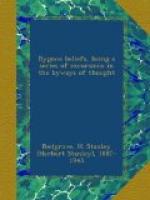The mantichora is described by PLINY (whose statements were unquestioningly accepted by the mediaeval naturalists), on the authority of CTESIAS (fl. 400 B.C.), as having “A triple row of teeth, which fit into each other like those of a comb, the face and ears of a man, and azure eyes, is the colour of blood, has the body of the lion, and a tail ending in a sting, like that of the scorpion. Its voice resembles the union of the sound of the flute and the trumpet; it is of excessive swiftness, and is particularly fond of human flesh."[1]
[1] PLINY: Natural History, bk. viii. chap. xxx. (BOSTOCK and RILEY’S trans., vol. ii., 1855, p. 280.)
Concerning the unicorn, in an eighteenth-century work on natural history we read that this is “a Beast, which though doubted of by many Writers, yet is by others thus described: He has but one Horn, and that an exceedingly rich one, growing out of the middle of his Forehead. His Head resembles an Hart’s, his Feet an Elephant’s, his tail a Boar’s, and the rest of his Body an Horse’s. The Horn is about a Foot and half in length. His Voice is like the Lowing of an Ox. His Mane and Hair are of a yellowish Colour. His Horn is as hard as Iron, and as rough as any File, twisted or curled, like a flaming Sword; very straight, sharp, and every where black, excepting the Point. Great Virtues are attributed to it, in expelling of Poison and curing of several Diseases. He is not a Beast of prey."[2] The method of capturing the animal believed in by mediaeval writers was a curious one. The following is a literal translation from the Bestiary of PHILIPPE DE THAUN (12th century):—
[2] [THOMAS BOREMAN]: A Description of Three Hundred Animals (1730), p. 6.
“Monosceros is an animal which has one
horn on its head,
Therefore it is so named; it has the form of
a goat,
It is caught by means of a virgin, now hear
in what manner.
When a man intends to hunt it and to take and
ensnare it
He goes to the forest where is its repair;
There he places a virgin, with her breast uncovered,
And by its smell the monosceros perceives it;
Then it comes to the virgin, and kisses her
breast,
Falls asleep on her lap, and so comes to its
death;
The man arrives immediately, and kills it in
its sleep,
Or takes it alive and does as he likes with
it.
It signifies much, I will not omit to tell it
you.
“Monosceros is
Greek, it means one horn in French:
A beast of such a description signifies Jesus
Christ;
One God he is and shall be, and was and will
continue so;
He placed himself in the virgin, and took flesh
for man’s sake,
And for virginity to show chastity;
To a virgin he APPEARED and a virgin conceived
him,
A virgin she is, and will be, and will remain
always.
Now hear briefly the signification.




